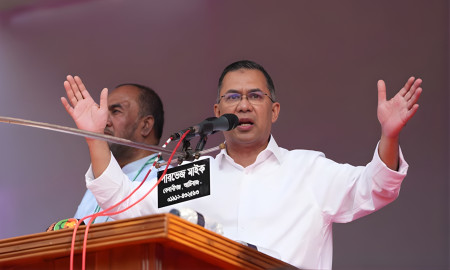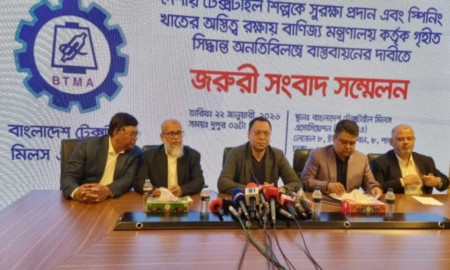Diploma Engineers' ‘Backdoor’ Entry Into 9th Grade Cadre Posts, Graduates Allege

A growing crisis surrounds the promotion of engineering posts to the equivalent of Bangladesh Civil Service (BCS) cadre positions, with both BSc engineering graduates and polytechnic diploma holders claiming deprivation. The contention stems from allegations by engineering university students that polytechnic diploma holders are securing ninth-grade posts equivalent to BCS cadre positions without undergoing the rigorous BCS examination process, which includes preliminary, written, and viva stages. This has created unrest in the engineering sector, with both sides asserting their rightful claim to ninth-grade posts, leading to a deepening crisis affecting at least five government departments over ninth and tenth-grade positions, according to sources.
Engineering university graduates argue that diploma holders, trained to work as technicians, supervisors, or assistants to engineers, are now directly employed as engineers. They claim that diploma holders are being promoted to ninth-grade BCS cadre-equivalent posts solely based on five years of work experience, bypassing the BCS examination. Additionally, they allege that these posts are being blocked through additional responsibilities rather than regular recruitment processes.
In contrast, polytechnic diploma holders refute these claims, asserting that their progression from tenth to ninth grade is in line with standard procedures and is their rightful entitlement. They accuse engineering university students of attempting to destabilize a settled issue.
According to engineering university students, the engineering sector has two entry-level posts: sub-assistant engineer (tenth grade) and assistant engineer (ninth grade). The tenth-grade sub-assistant engineer post is exclusively reserved for polytechnic diploma holders, with a 100 percent quota, barring university graduates with BSc or postgraduate degrees in engineering from applying. Meanwhile, general tenth-grade posts across other sectors require a bachelor’s or master’s degree as the minimum qualification. This restriction prevents BSc engineers from applying for tenth-grade posts in their own sector, contributing to unemployment, frustration, and brain drain, as talented professionals are compelled to seek opportunities abroad.
Data and discussions with both sides reveal that a 2008 gazette classified diploma holders as supervisors or technicians. Following protests in 2013, the sub-assistant engineer post was elevated to the tenth grade. Subsequently, through advocacy by various diploma holder organizations, a minimum 33 percent quota for ninth-grade assistant engineer posts was introduced, with some cases extending to 50, 67, or even 100 percent.
This issue is documented in gazettes of institutions like the Bangladesh Applied Nutrition Research and Training Institute and the Directorate of Technical Education. Engineering university students allege that diploma holders are violating recruitment rules by securing assistant engineer (acting) posts with minimal experience, interfering unacceptably with the engineering structure. Such instances are evident in documents from the Power Development Board (PDB), Public Works Department (PWD), and Dhaka WASA.
They further claim that diploma holders, without BCS qualifications, are controlling BCS engineering cadre members through promotions to ninth-grade posts. This practice is reportedly common in BCS, PWD, Roads and Highways Department (RHD), and the Department of Public Health Engineering (DPHE), disrupting the evaluation and administrative balance of the BCS engineering cadre.
The students note that diploma holders have secured 42.7 percent of promotions in PWD’s civil branch and 52.4 percent in the electrical and mechanical branches by pressuring chief engineers. In Dhaka WASA, after the recruitment process, the Diploma Engineers Association’s intervention reduced assistant engineer posts from 26 to 10, ensuring promotions for diploma holders. They argue that diploma holders dominate 81.6 percent of engineering posts, leaving only 18.4 percent for BSc engineers, undermining professionalism and the integrity of the engineering sector, which they believe should be entirely reserved for BSc engineers.
The students highlight that while BCS-qualified engineers in government technical schools and colleges remain stuck at the ninth grade, diploma holders are promoted to tenth, ninth, and even fourth-grade posts without competitive examinations. Some diploma holders, promoted at year-end, are considered senior to BCS engineers within the same year. Consequently, engineering cadre posts have been declining, with 173 posts in the 43rd BCS, increasing to 291 in the 44th, but dropping to 127, 152, and 46 in the 45th, 46th, and 47th BCS, respectively, raising concerns about the cadre’s future.
Shakil Ahmed Iqbal, a student from Chittagong University of Engineering and Technology’s 16th batch, said, “After SSC, those completing three-to-four-year diploma courses from polytechnics have nearly monopolized the engineering sector. Through lobbying and other tactics, diploma holders are usurping engineering posts. Previously, they were recruited as technicians, supervisors, surveyors, draftsmen, or machine operators with third-class employee status. Around 1993, through nationwide protests and blockades, they forcibly secured second-class status.”
Mohammad Sakibul Haque Lipu, a key organizer of the Engineers’ Rights Movement, alleged, “Without appearing for BCS exams—preliminary, written, or viva—diploma holders are becoming BCS cadre through promotions. In PWD, RHD, Railways, Technical Education, and DPHE, they secure jobs at the tenth-grade non-cadre level through internal competition and become BCS cadre after five years of promotion. When job advertisements for ninth-grade assistant engineer posts demand BSc engineers, diploma holders file lawsuits for promotions, stalling the process. Institutions, unable to recruit BSc engineers, assign acting or temporary duties to diploma holders. These irregularities must stop, and recruitment should be merit-based, or public university students across the country will launch protests.”
However, Sakhawat Hossain, member secretary of the Institute of Diploma Engineers Bangladesh (IDEB) interim committee, denied that diploma holders become BCS cadre, stating, “Engineering university students are trying to fish in troubled waters. Diploma engineers are promoted according to rules and regulations. The difference between us is just one grade. Promotion is our right. In many cases, we are deprived, and we need 100 percent promotions to end this deprivation.”
Addressing allegations of blocking posts through writs, he added, “It’s not true in all cases. Some candidates, frustrated by delayed promotions, approach the courts, and the court’s directives are final. There is no deliberate blocking of posts. Engineering students are trying to destabilize a resolved issue, and we strongly condemn such actions.”












